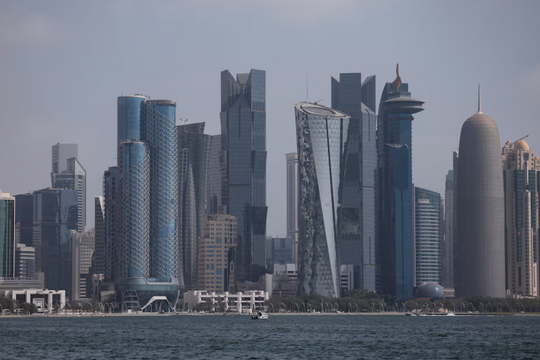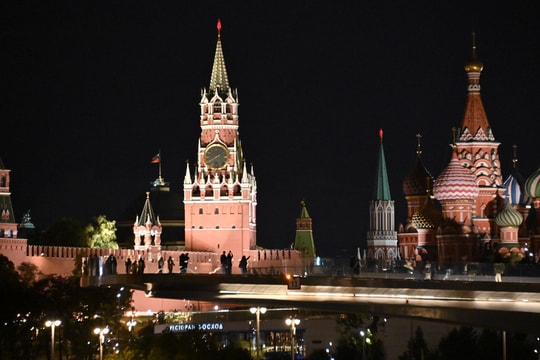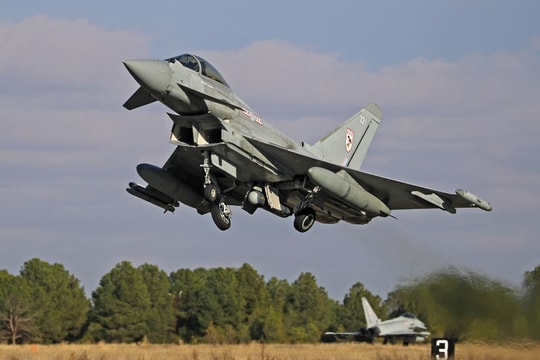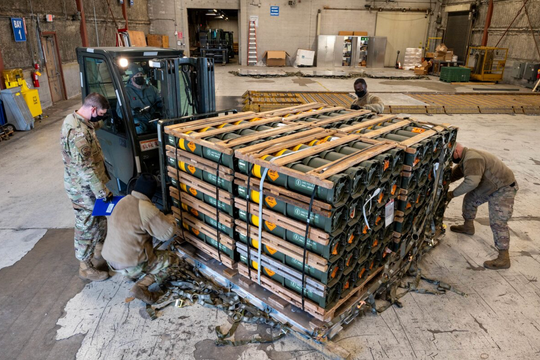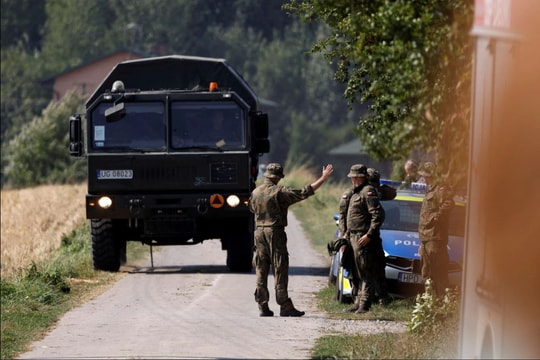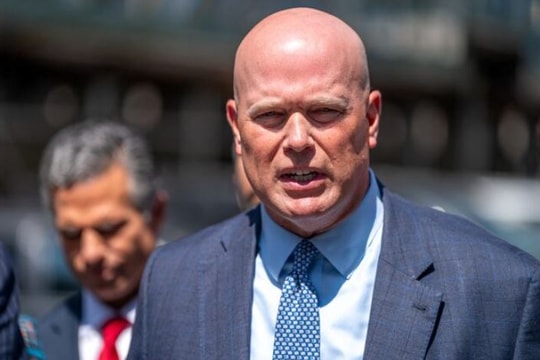NATO's betrayal makes Putin lose faith in the West
NATO had pledged to the Soviet Union not to expand eastward in exchange for German unification, but later broke that promise.
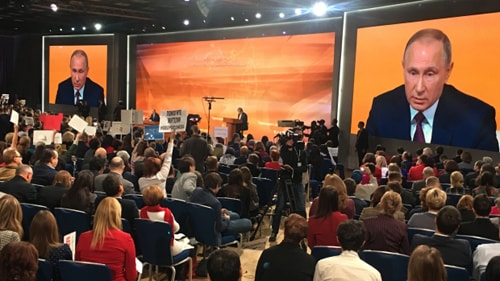 |
President Putin answers reporters at a press conference yesterday. Photo: CBC. |
During a four-hour "super press conference" attended by thousands of reporters yesterday, Russian President Vladimir Putin praised his US counterpart Donald Trump for doing very well with the stock market rising and unemployment rate falling. However, the Kremlin leader criticized the West, saying that banning Russia from the Winter Olympics in South Korea was a "plot" to smear his image ahead of next year's election, according to CBC.
Observers say this is not the first time Putin has expressed anger and distrust of the West. Many experts say Russia's current geopolitical stance stems from a decisive moment in history, when the West broke its promise not to expand NATO eastward.
After searching through declassified files at the US National Security Archive, researchers at George Washington University found that these documents all indicate that senior US, German and British officials in the 1990s all made promises to Soviet leader Mikhail Gorbachev and his country's Foreign Minister Eduard Shevardnadze that NATO would not expand toward Russia's borders after German reunification.
When tasked with convincing the Soviet Union to agree to the reunification of East and West Germany, then-West German Foreign Minister Hans-Dietrich Genscher understood that only a promise not to expand NATO eastward could ensure success, according to Bloomberg.
He presented this view to the German people and key allies, such as British Foreign Secretary Douglas Hurd. Intending to bring a united Germany into NATO rather than maintain its neutrality, the United States agreed with Genscher's view. US Secretary of State James Baker made this clear to his Soviet counterpart Shevardnadze during a meeting in Moscow on February 9, 1990.
"A neutral Germany would certainly have an independent nuclear capability. But a Germany that is closely tied to a changed NATO, by which I mean a NATO that is less military and more political, would not need that independent nuclear capability," Baker said, according to a transcript of their conversation.
"Of course there will be firm guarantees that NATO will not expand its forces to the east. This will be done in the most reasonable way for Germany's eastern neighbors," Baker assured Shevardnadze.
The US Secretary of State reiterated this to Soviet leader Gorbachev in a meeting that same day. "If we maintain a presence in a NATO Germany, the alliance will not expand one inch to the east," Baker asserted. He made it clear that this was a Western commitment in exchange for keeping Germany united within NATO instead of making Germany a neutral country.
Mr Gorbachev replied that under any circumstances NATO expansion was "unacceptable". "We agree with that", Baker replied.
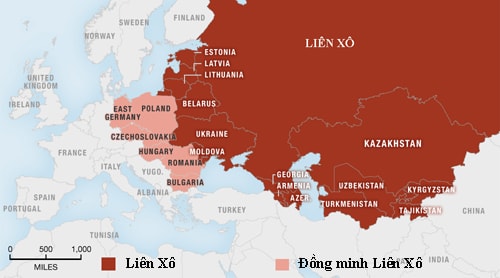 |
The Soviet Union and its allies before its collapse. Graphic: NPR. |
During the same meeting, CIA Director Robert Gates also made a similar proposal to KGB chief Vladimir Kryuchkov.
In subsequent discussions, the Soviet side wanted to build a common security structure in Europe, based on the Organization for Security and Cooperation in Europe, which had been established nearly 20 years earlier as a forum for cooperation between the Soviet Union and the US-led alliance. Western negotiators agreed but said they wanted to retain NATO, making it an organization more open to cooperation with the Soviet Union and the Warsaw Pact.
As late as March 1991, six months after German reunification, British Prime Minister John Major was still reassuring Soviet Defense Minister Dmitri Yazov that NATO would not move eastward and that he saw no future conditions for Eastern European countries to become NATO members.
NATO Secretary General Manfred Woerner later assured the Russian delegation on behalf of President Boris Yeltsin that 13 of NATO's 16 members opposed enlargement and that he himself was against it.
However, all these Western commitments were not included in specific agreements, because the Soviet Union was then in a very difficult situation and was in dire need of the aid that Germany offered in exchange for unification, as well as being heavily dependent on loans from the West.
That situation left the Soviet Union in no position to make demands on the West, even if it realized that the promises of a common security system were a bluff.
Observers say that during the negotiations with the Soviet Union at that time, the US considered itself the winner, ignoring Gorbachev's proposals and non-binding promises. When the Soviet Union collapsed and Eastern European countries asked to join NATO, the West forgot all the promises it had made.
Poland, the Czech Republic and Hungary joined NATO in 1999, and Russia's three Baltic neighbors, Estonia, Latvia and Lithuania, also became members in 2004.
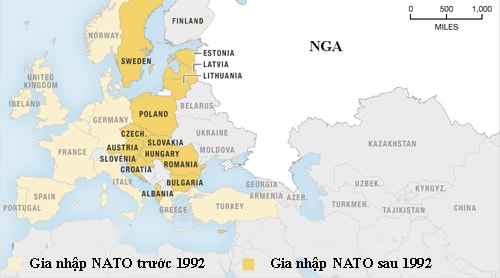 |
NATO continued to expand eastward after 1991. Graphic: NPR. |
According to experts at George Washington University, as a former KGB officer who spent five years in East Germany, Putin likely had access to Soviet documents about the promises NATO made in 1990-1991.
In his famous 2007 speech at the Munich Security Conference, Putin cited Woerner's pledge not to expand NATO. He later appeared to want to negotiate with the West the way he believed the West had negotiated with the Soviet Union.
Western negotiators now realize that they cannot negotiate with Putin because he “says one thing but means another” and does not reveal what he really wants. This is how winners negotiate with losers.
Putin has always said that the collapse of the Soviet Union was a "tragedy" and scholars say that studying this period of history has changed his view of the West. In his view, the West only really talks with force, and promises are just a game like the one US President George HW Bush and Secretary of State Baker played with Gorbachev and Shevardnadze.
Researchers at George Washington University say the way the West broke promises made to the Soviet Union is not all the reason for Putin's negative view of the West, but it plays an important role in the leader's changing worldview.
This is why the West today will never be able to negotiate a real deal with Putin or his successor. They will not easily forget the promises that have been buried in history, so the confrontation between Russia and the West can continue for years, even decades to come.
According to VNE
| RELATED NEWS |
|---|

